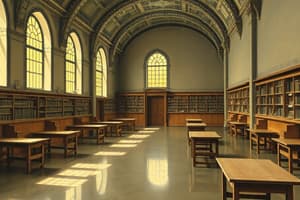Podcast
Questions and Answers
What distinguishes alternative schools from traditional schools?
What distinguishes alternative schools from traditional schools?
What is a key feature of Middle Schools as outlined in the text?
What is a key feature of Middle Schools as outlined in the text?
Which of the following is an example of an alternative school?
Which of the following is an example of an alternative school?
Which type of school allows parents to educate their children at home?
Which type of school allows parents to educate their children at home?
Signup and view all the answers
What is the primary focus of Magnet Schools?
What is the primary focus of Magnet Schools?
Signup and view all the answers
Which type of school offers a child-centered approach and allows students to work at their own pace?
Which type of school offers a child-centered approach and allows students to work at their own pace?
Signup and view all the answers
What do Vocational and Technical Schools primarily provide students with?
What do Vocational and Technical Schools primarily provide students with?
Signup and view all the answers
Which type of school focuses on offering students support for disabilities through tailored curricula and specialized services?
Which type of school focuses on offering students support for disabilities through tailored curricula and specialized services?
Signup and view all the answers
What is the primary feature of AI-Enhanced Learning?
What is the primary feature of AI-Enhanced Learning?
Signup and view all the answers
Which type of school uses a holistic approach to education focusing on artistic expression and creativity?
Which type of school uses a holistic approach to education focusing on artistic expression and creativity?
Signup and view all the answers
Study Notes
Which is School: Exploring the Variety of Educational Institutions
From neighborhood kindergartens to prestigious universities, the landscape of education encompasses a vast array of learning environments designed to cater to diverse needs and ambitions. In this article, we'll focus on the types of schools that make up our educational system, some of which you may not have come across until now.
Traditional Schools
Traditional schools follow a structured curriculum, with classes divided by age and grade level. They offer a broad range of subjects to prepare students for higher education, careers, and citizenship.
- Elementary Schools (K-5) provide a foundation in reading, writing, math, and social studies.
- Middle Schools (6-8) offer more specialized subjects, often including electives like art, music, and foreign languages.
- High Schools (9-12) help students prepare for college or join the workforce, offering a wide range of classes including Advanced Placement (AP) and International Baccalaureate (IB) courses.
Alternative Schools
Alternative schools challenge the traditional approach to education by offering innovative, often personalized learning environments.
- Charter Schools are publicly funded institutions that offer a specific educational focus or philosophy, such as language immersion, STEM, or the arts.
- Homeschooling allows parents to educate their children at home using a curriculum of their choice.
- Online Schools provide an entirely digital learning experience, using web-based resources and platforms to deliver courses and assignments.
Specialty Schools
Specialty schools cater to students with specific interests, talents, or needs.
- Magnet Schools focus on specialized subject areas, such as math, science, or performing arts.
- Vocational and Technical Schools offer career and technical education, providing students with training in specific trades and skills.
- Special Education Schools provide education and support for students with disabilities, offering tailored curricula and specialized services.
Non-Traditional Learning Environments
Non-traditional learning environments challenge the conventional structure of education by offering unique learning experiences.
- Montessori Schools use a child-centered approach, allowing students to work at their own pace and enhance their critical thinking skills.
- Waldorf Schools focus on artistic expression, creativity, and a holistic approach to education.
- Project-Based Learning (PBL) Schools offer a hands-on, collaborative approach to education, focusing on real-world problem-solving.
The Future of Education: AI and Personalized Learning
As technology continues to shape the educational landscape, new learning environments are emerging.
- AI-Enhanced Learning uses artificial intelligence to personalize the educational experience, adapting to each student's learning style and needs.
- Holographic Learning uses 3D holograms to create immersive learning environments, offering students the chance to interact with and explore complex concepts.
- Gamified Learning uses game-like elements to engage students and make learning more fun and interactive.
Schools come in many shapes and sizes, each offering unique educational experiences designed to meet diverse student needs and interests. Whether you're a parent choosing the right school for your child, a student exploring their educational options, or an educator seeking new and innovative teaching methods, there's a school for you! provide context for the technology-related aspects mentioned, but the focus of this article is on school types.
Studying That Suits You
Use AI to generate personalized quizzes and flashcards to suit your learning preferences.
Description
Discover the diverse landscape of educational institutions, from traditional schools to alternative and specialty schools. Learn about non-traditional learning environments and the future of education with AI-enhanced learning, holographic learning, and gamified learning. Whether you're a parent, student, or educator, explore the array of school options available to cater to different needs and interests.




